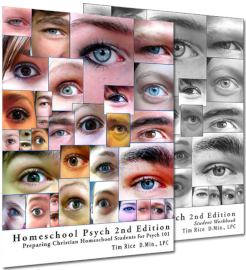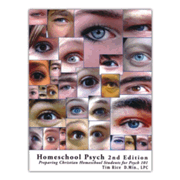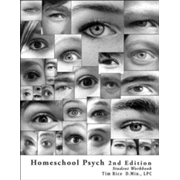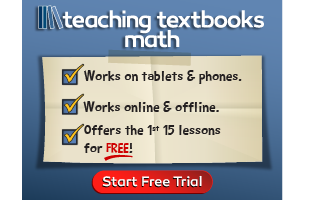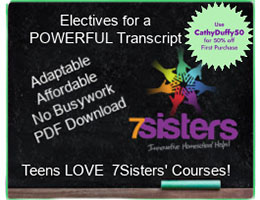Homeschool Psych, 2nd Edition: Preparing Christian Homeschool Students for Psych 101 offers an introduction to psychology for high school students in the context of a Christian worldview. The course consists of a textbook and a student workbook. The second half of the workbook has quizzes and answer keys for the chapter questions and quizzes.
The 167-page textbook covers more content than you might expect for that number of pages. The dense print (in a relatively small font) has almost twice the amount of text per page than I typically see in most other textbooks for high school science and history courses comparable to this one. (It's simple to enlarge the PDF on a screen if the font is too small.) This course is much more challenging than Introduction to Psychology from a Christian Perspective (7 Sisters) and is closer in difficulty to Sonlight’s Psychology Level 690. Note that Sonlight’s course prepares students for the AP (Advanced Placement) Psychology exam, while this course can serve as one component in preparation for that exam. On the other hand, Homeschool Psych’s addition of worldview perspectives raises its level of difficulty in a different fashion than does Sonlight’s course.
Author Dr. Tim Rice explains why he included the study of worldviews. Since most college students will take a psychology course, he believes they need to be prepared in advance for what they are likely to encounter. As he explains in the textbook, “Homeschoolers are sometimes un-prepared to recognize and refute modern psychology’s core philosophical assumptions: naturalism, behaviorism, humanism, evolutionism, empiricism, moral relativism, and reductionism” (p. 1).
Worldview coverage is integrated throughout the course, but the second and third chapters give it even more attention. Chapter 2, “A Christian worldview,” discusses the idea of a Christian worldview and how it relates to the most important questions, not just psychology. This chapter makes the course accessible to students who have not previously studied worldviews. The second chapter ends with a warning to stop reading until the student is clear about their Christian worldview. The study guide includes a lengthy set of questions (best used for discussion) that can help students dig deeper into worldview questions. These questions are great for those not yet sure they hold a Christian worldview as well as those who believe that they do. The third chapter, “Psychology’s History and Worldview,” includes key people and schools of thought, as well as discussions about the worldviews they reflect.
Aside from worldview coverage, Homeschool Psych covers topics you typically see in an introductory psychology course: the history of psychology, the brain, the nervous system, sensation and perception, motivation and emotion, learning and memory, human development, consciousness, thinking, language, intelligence, personality, abnormal psychology, treatment for psychological problems, social psychology, and research methods. Students are expected to become familiar with many names and terms in addition to information such as the major divisions of the nervous system and the criticisms of Piaget’s theory of cognitive development.
The textbook has a brief introduction, 16 chapters, an index, and a lengthy list of references for each chapter. Following the lesson content, each chapter concludes with a summary of key points and a set of “For Review” questions, both of which are very similar to the summary and short essay questions in the student workbook.
The Student Workbook
For each of the textbook’s 16 chapters, the student workbook includes a chapter outline, a summary, a list of objectives, pages for notetaking by filling in the blanks (for all except the first chapter), short-essay questions, and recommended reading material and websites for further study. Most chapters also have another set of questions labeled “For Further Discussion.”
The short-essay questions in the workbook are generally comprehension questions that ask students to repeat information from the chapter, such as, “Name the four purposes for psychological research” (page 4) and “What is Cartesian dualism?” (page 15). Some questions require very brief answers rather than short essays. Generally, students should write out their answers.
The short-essay questions for the second chapter are an exception since some of them ask students what they believe about worldview issues such as moral absolutes and the causes of mental pain and suffering. The “For Further Study” questions at the end of most chapters are also more open-ended, such as, “Compare the Bible’s suggestions for Christian living to secular techniques for stress management” and “Identify real-life situations in which students were intrinsically motivated and a time when they were extrinsically motivated” (both on page 37). These questions are best used for discussion.
Students are supposed to fill in the blanks of the “study guide” pages in the workbook as they read through the chapter material. Beginning with chapter three, there are answer keys for these pages. I expect that students will rely on these pages to prepare for each quiz.
The student workbook also has 12 quizzes, a few of which cover more than one chapter. Each quiz has ten multiple-choice questions, and answer keys are included.
Note that Dr. Rice teaches Psychology: A Christian Perspective live online, covering essentially the same course content. If this option interests you, check the website for that course’s availability.
Summary
Homeschool Psych offers an opportunity for all homeschoolers to examine the field of psychology through a Christian worldview, whether or not they intend to take psychology in college. If they do plan to take it in college, they should be well prepared.

